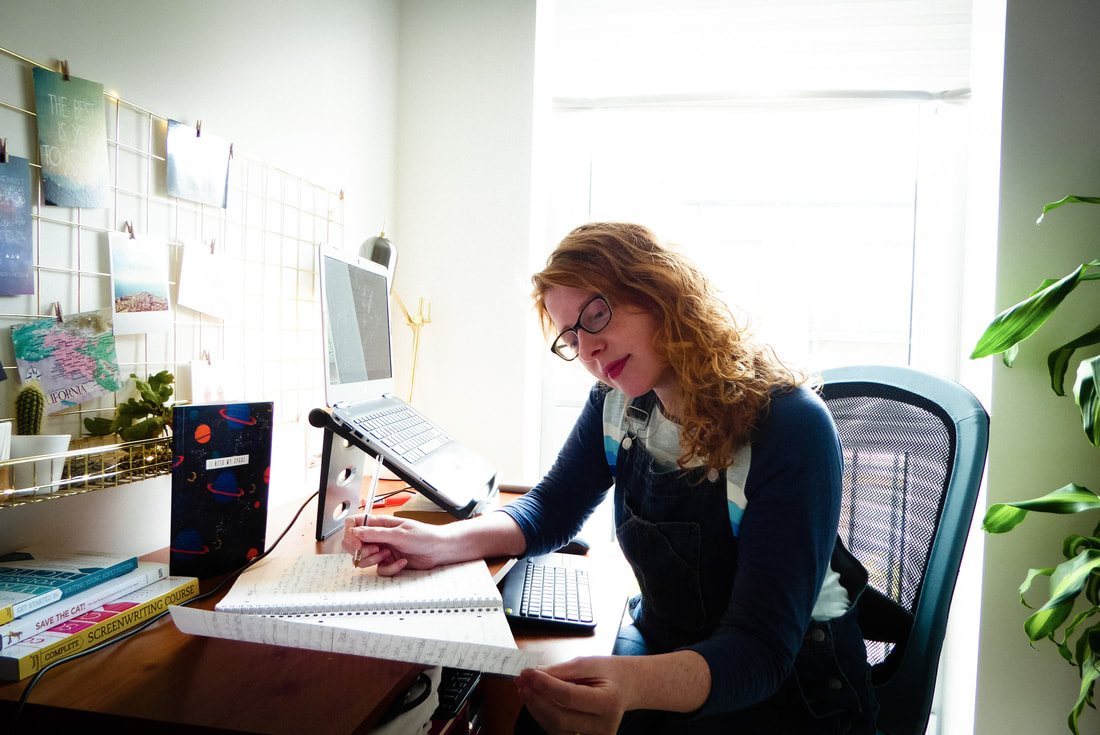|
It's time to face an uncomfortable truth. This blog post has been in the making since early this year and I'm so glad I can post it now, having found the perfect home for the second installment. It's directly informed by my experience as a disabled writer on low income, and it's my hope to raise awareness and create positive change by starting a dialogue about the barriers I face in developing my writing. Part Two: Creating Change, will be published this Sunday at WOWCON - the inaugural online writing conference run by Write Mentor. I’ve lost count of the number of times I’ve been told how invaluable it is to have an editor read your manuscript, or to have a mentor work through a re-draft with you, or to go on a residency to have some ‘dedicated time’ to honing your draft. The reality is, those who are disabled or on low income simply cannot afford to pay for access to these opportunities. That puts us at the bottom of the pile when it comes to our work being seen, picked up, and published. The free opportunities that do exist are hugely competitive and rare – I know, I’ve applied (both successfully and unsuccessfully). They also depend hugely on timing, and whether your current project needs particular support at a particular time. Most development opportunities cost money. Discounts exist usually as concession or student rates. But what about those who are on low income and/or disabled? Often there is an option to evidence receipt of benefits to be considered eligible for a concession, but under austerity, thousands are being left without support. When your worth is distilled down to the capitalist value of your ability to ‘earn your living’ you quickly feel as a disabled person that you don’t matter. If you don't earn? Your voice doesn’t matter. Whilst I've been incredibly fortunate to have friends read my manuscript and give me valuable feedback, it still doesn't put me at the same level as those who can afford to pay for professional editing and mentoring. Having experience as a children's bookseller and literary agent's submissions reader, I'm in a more fortunate position than most without professional help; but I know only too well that professional editing or mentoring would give my manuscript the best shot possible at publication. Being disabled makes it really bloody hard to work in any capacity that earns anything remotely close to a decent living, let alone to also support your writing. We already know that writers get a raw deal when it comes to income, with the average fiction writer earning just £11k per year and most earning miles below that. Publishers don’t value their writers anymore and are looking for the next big debut to drive up sales. Add to that working in a low-wage industry or being disabled – and it’s a much direr situation. Many who are able will substitute their earnings. My disabilities make it impossible for me to do this. I go at a slower pace – the key word. I get a pretty good amount done, considering. But my writing output isn't as consistent as someone who doesn't battle with chronic illness, brain-fog and fatigue. Writing is my only ‘living’ because it’s the only thing I can do whilst managing my illnesses. "Paying to be published creates temptation for the emerging writer to undervalue ones worth. The problem with this is threefold; it’s exploitative, exclusionary, and it makes access a privilege." The platforms that support my writing are small, indie presses, with very little to give – usually (no surprise) run by other writers, also trying to make ends meet. I firmly believe writers need to be paid fairly (I will only write for others if I'm paid a fair rate). An exception to this might be if a writer is volunteering their work to support a cause, in which case payment may not be possible, but that's not to say any piece of writing which raises awareness should not be paid for. On the other end of the spectrum, many small magazines wouldn’t be alive without a financial contribution from those whom it publishes – but paying to be published creates temptation for the emerging writer to undervalue ones worth. The problem with this is threefold; it’s exploitative, exclusionary, and it makes access a privilege. There’s no ignoring the fact that emerging and marginalised writers feel pressured to take unpaid opportunities to build their portfolio, due to submissions guidelines requesting examples of previously published work: it’s a catch-22; take on unpaid work and you risk your reputation as a ‘serious writer’ but without a portfolio you get nowhere with paying publications. We need to focus on creating more, accessible, paid opportunities for low income and disabled writers. "Some of us simply can't afford it. And that too-easily gets overlooked, or glossed-over, in a capitalist economy. It’s protecting those who make money at the exclusion of those who don’t."
As a disabled, emerging writer, unable to support myself via alternative means, I've had to miss out on a lot of opportunities – be it courses, memberships or awards, because fees are a very real, very solid barrier to my accessing them. That's not saying they aren't worth the cost, but some of us simply can't afford it. And that too-easily gets overlooked, or glossed-over, in a capitalist economy. It’s protecting those who make money at the exclusion of those who don’t. And when we don’t have access, we don’t have inclusion or representation. Just look at the Bath Novel Awards and Bridport Prize – prestigious, for a price. This year, the Bridport Prize ran a competition to cover the entry-fee for five people who couldn’t afford to pay the £25, kindly sponsored by Polly Crosby, a writer and previous runner-up, living with cystic fibrosis, who wanted to support those without the means. But should the responsibility not fall to the organisers? Could the cost have been sponsored or matched, from the thousands of entry fees? Membership organisations, like SCWBI, undoubtedly provide a necessary, supportive community and opportunities for writers, including their Undiscovered Voices Award – but the £95 annual fee (which is arguably fantastic value), is prohibitive to many (and you have to be a member to apply to the award). Even festivals curated for writers who want to develop their craft come with a hefty ticket price: The Festival of Writing, Run by Jericho Writers, comes in at £595 to attend the full weekend, and the Winchester Writing Festival at £485 to attend theirs. Both run a bursary scheme funded by literary agents, where one lucky winner gets an all-access pass for the weekend, and Winchester fund up to £100 of travel costs. I was lucky to be selected as a runner-up for the Jericho-Marjacq Bursary for Under-Represented Voices, funded by Marjacq Scripts, which gave me a year-long membership to the Jericho Writers website of online resources which has been incredibly helpful. But one bursary per festival unfortunately isn’t going to make substantial impact on the disabled and marginalised writing community. It’s the hard truth. Add to the ticket price your travel costs (trains are becoming increasingly out of reach to many due to massive, privatised price-hikes), or the need to travel with a carer, or a sign-language interpreter, the cost of a room/s for several nights – and the financial load becomes considerably heavier for people living with a disability. It’s time we lightened that load. If you'd like to find out how, check out Part Two: Creating Change, publishing this Sunday at WOWCON – an online writing conference run by Write Mentor.
0 Comments
Leave a Reply. |
My latest writings, and thoughts on disability, mental health and young-adult lit. Archives
September 2022
|


 RSS Feed
RSS Feed